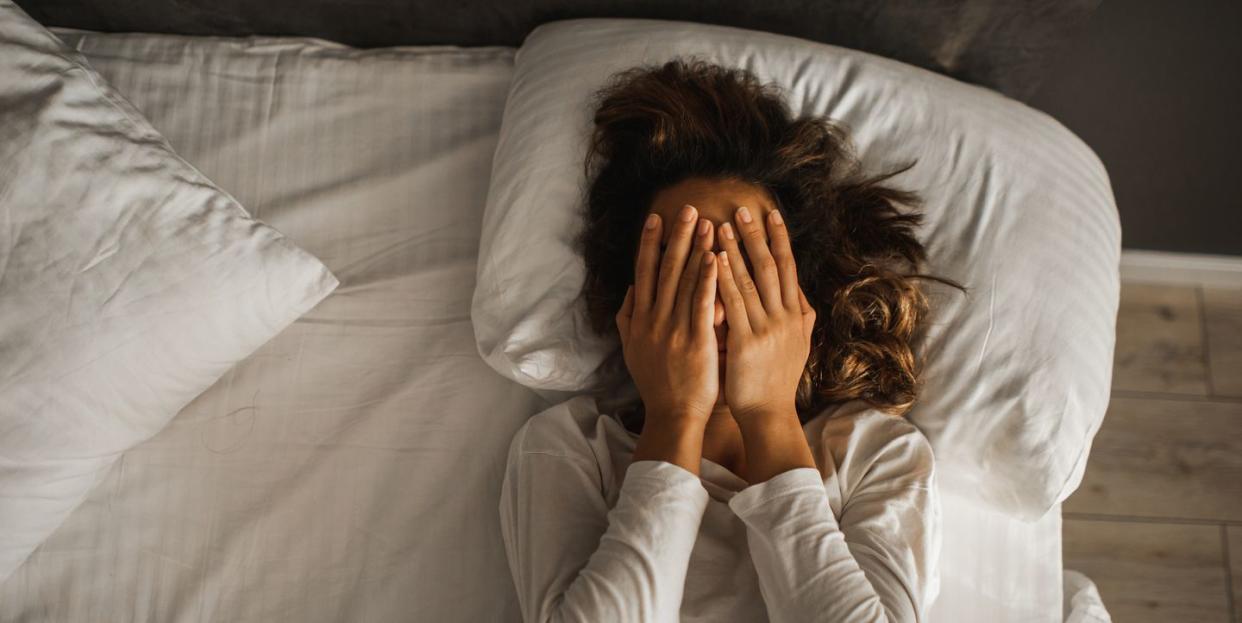This Common Sleep Condition Could Increase Your Risk for Stroke, Study Finds

Insomnia may raise your risk for stroke, according to new research.
People under 50 years old who experienced moderate to severe insomnia had nearly four times the risk of stroke compared to people with no symptoms.
Brain health experts explain the findings.
If you find yourself lying awake at night unable to fall asleep often, you may struggle with insomnia. While this condition may seem of little consequence, besides your lack of rest, new research shows that people with insomnia could be at a higher risk for stroke.
A study published in Neurology investigated the link between the symptoms of insomnia and the risk of stroke. The study included 31,126 people (average age of 61 years) who had no history of stroke at the beginning of the study. Patients answered questions about how frequently they had trouble falling asleep, waking up during the night, waking up too early, and not being able to return to sleep. Researchers judged the severity of symptoms on a scale of 1 (less severe) to 8 (more severe).
Researchers followed up with participants after nine years, during which participants experienced a total of 2,101 strokes. Researchers found that those who reported experiencing five to eight symptoms of insomnia had a 51% higher risk of stroke compared to those who reported no symptoms.
The link between insomnia symptoms and stroke was stronger in participants under 50 years old who experienced five to eight symptoms, having nearly four times the risk of stroke compared to people without symptoms. But, people 50 or older with five to eight symptoms still had a large (38%) increased risk of stroke compared to people with no symptoms.
“This difference in risk between these two age groups may be explained by the higher occurrence of stroke at an older age,” study author Wendemi Sawadogo, M.D., M.P.H., Ph.D., said in a press release. “The list of stroke risk factors such as high blood pressure and diabetes can grow as people age, making insomnia symptoms one of many possible factors. This striking difference suggests that managing insomnia symptoms at a younger age may be an effective strategy for stroke prevention.”
So, what is insomnia and how does it impact stroke risk?
Insomnia is either difficulty falling asleep or staying asleep, says Amit Sachdev, M.D., director of the Division of Neuromuscular Medicine at Michigan State University. Put simply, “insomnia is related to increased blood pressure, which can increase the risk of stroke.”
Poor sleep likely causes inflammatory and metabolic dysregulation that is associated with types of diabetes, heart disease, and high blood pressure, which are known risk factors for stroke, adds Adi Iyer, M.D., a neurosurgeon at Pacific Neuroscience Institute at Providence Saint John’s Health Center in Santa Monica, CA. “The link between poor sleep and stroke in older patients is lower most likely because the risk of stroke in general is so much greater in the elderly across all domains. As patients get older, the relative influence of sleep diminishes in comparison to their other health conditions such as hypertension, diabetes, and heart disease.”
The bottom line
Sleep disorders should be treated like any other serious health condition as they have long-term implications on overall health including stroke risk, says Dr. Iyer. “The importance of this study is that clinicians can help optimize sleep patterns to reduce the risk of stroke, particularly in young patients.” However, he notes that the main limitation of this study is that sleep patterns were self-reported in a survey and that various types of insomnia were not well distinguished by participants, so take the results with a grain of salt.
Stress reduction and good body health are both important for reducing the risk of stroke, says Dr. Sachdev, and both are influenced by sleep. “It might sound boring, but the body likes a good routine,” he adds. Finding one can go a long way towards supporting a good night’s sleep, and thus, a long way towards brain health.
You Might Also Like

